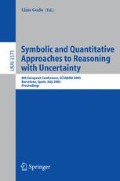Abstract
In this paper, we extend the abstract argumentation framework proposed by [1] in order to take into account two kinds of interaction between arguments: a positive interaction (an argument can help, support another argument) and a negative interaction (an argument can attack another argument). In this new abstract argumentation framework, called a bipolar argumentation framework, we propose a gradual interaction-based valuation process. With this process, the value of each argument A only depends on the value of the arguments which are directly interacting with A in the argumentation system.
Access this chapter
Tax calculation will be finalised at checkout
Purchases are for personal use only
Preview
Unable to display preview. Download preview PDF.
References
Dung, P.M.: On the acceptability of arguments and its fundamental role in nonmonotonic reasoning, logic programming and n-person games. Artificial Intelligence 77, 321–357 (1995)
Fox, J., Parsons, S.: On using arguments for reasoning about values and actions. In: Proc. of AAAI-Symposium on qualitative preferences in deliberation and practical reasoning, pp. 55–63 (1997)
Parsons, S.: Normative argumentation and qualitative probability. In: Nonnengart, A., Kruse, R., Ohlbach, H.J., Gabbay, D.M. (eds.) FAPR 1997 and ECSQARU 1997. LNCS, vol. 1244, pp. 466–480. Springer, Heidelberg (1997)
Amgoud, L., Maudet, N., Parsons, S.: Arguments, Dialogue and Negociation. In: Proc. of the 14th ECAI, pp. 338–342 (2000)
Parsons, S., Sierra, C., Jennings, N.R.: Agents that reason and negociate by arguing. Journal of Logic and Computation 8, 261–292 (1998)
Karacapilidis, N., Papadias, D.: Computer supported argumentation and collaborative decision making: the hermes system. Information systems 26, 259–277 (2001)
Gordon, T., Karacapilidis, N.: The zeno argumentation framework. In: Proc. of the 6th International Conference on Artificial Intelligence and Law, pp. 10–18 (1997)
Verheij, B.: On the existence and multiplicity of extension in dialectical argumentation. In: Proc. of the 9th NMR, pp. 416–425 (2002)
Amgoud, L., Maudet, N., Parsons, S.: Modelling dialogues using argumentation. In: Proc. of the 4th ICMAS, pp. 31–38 (2000)
Amgoud, L., Prade, H.: Reaching agreement through argumentation: A possibilistic approach. In: Proc. of the 9th KR (2004)
Kraus, S., Sycara, K., Evenchik, A.: Reaching agreements through argumentation: a logical model and implementation. Journal of Artificial Intelligence 104 (1998)
Rahwan, I., Ramchurn, S.D., Jennings, N.R., McBurney, P., Parsons, S., Sonenberg, L.: Argumentation-based negotiation. Knowledge engineering review (2004)
Ramchurn, S.D., Jennings, N., Sierra, C.: Persuasive negotiation for autonomous agents: a rhetorical approach. In: CMNA (2003)
Rahwan, I., Sonenberg, L., Dignum, F.: Towards interest-based negotiation. In: AAMAS 2003 (2003)
Jakobovits, H., Vermeir, D.: Robust semantics for argumentation frameworks. Journal of logic and computation 9(2), 215–261 (1999)
Besnard, P., Hunter, A.: A logic-based theory of deductive arguments. Artificial Intelligence 128(1-2), 203–235 (2001)
Pollock, J.L.: Defeasible reasoning with variable degrees of justification. Artificial Intelligence 133, 233–282 (2001)
Hunter, A.: Making argumentation more believable. In: Proc. of AAAI 2004 (2004)
Amgoud, L., Cayrol, C.: Inferring from inconsistency in preference-based argumentation frameworks. Journal of Automated Reasoning 29, 125–169 (2002)
Bench-Capon, T.: Persuasion in practical argument using value-based argumentation frameworks. Journal of Logic and Computation 13, 429–448 (2003)
Simari, G., Loui, R.: A mathematical treatment of defeasible reasoning and its implementation. Artificial Intelligence 53, 125–157 (1992)
Geffner, H., Pearl, J.: Conditional entailment: bridging two approaches to default reasoning. Artificial Intelligence 53, 209–244 (1992)
Elvang-Goransson, M., Fox, J., Krause, P.: Dialectic reasoning with inconsistent information. In: Proc. of the 9th UAI, pp. 114–121 (1993)
Benferhat, S., Dubois, D., Prade, H.: Argumentative inference in uncertain and inconsistent knowledge bases. In: Proc. of the 9th UAI, pp. 411–419 (1993)
Dung, P.M., Son, T.C.: An argument-based approach to reasoning with specificity. Artificial Intelligence 133, 35–85 (2001)
Prakken, H., Sartor, G.: Argument-based extended logic programming with defeasible priorities. Journal of Applied Non-Classical Logics 7, 25–75 (1997)
Kowalski, R.A., Toni, F.: Abstract argumentation. Artificial Intelligence and Law 4, 275–296 (1996)
Krause, P., Ambler, S., Elvang, M., Fox, J.: A logic of argumentation for reasoning under uncertainty. Computational Intelligence 11(1), 113–131 (1995)
Kohlas, J., Haenni, R., Berzati, D.: Probabilistic argumentation systems and abduction. In: Proc. of the 8th NMR - Uncertainty Frameworks subworkshop, pp. 391–398 (2000)
Pollock, J.L.: How to reason defeasibly. Artificial Intelligence 57, 1–42 (1992)
Amgoud, L., Cayrol, C., Lagasquie-Schiex, M.C.: On the bipolarity in argumentation frameworks. In: Proc. of the 10th NMR, Uncertainty Framework subworkshop, pp. 1–9 (2004)
Boutilier, C.: Towards a logic for qualitative decision theory. In: Proc. of the 4th KR, pp. 75–86 (1994)
Tan, S.W., Pearl, J.: Specification and evaluation of preferences under uncertainty. In: Proc. of the 4th KR, pp. 530–539 (1994)
Lang, J., Van der Torre, L., Weydert, E.: Utilitarian desires. Journal of Autonomous Agents and Multi-Agents Systems 5(3), 329–363 (2002)
Benferhat, S., Dubois, D., Kaci, S., Prade, H.: Bipolar representation and fusion of preferences in the possibilistic logic framework. In: Proc. of the 8th KR, pp. 158–169 (2002)
Cayrol, C., Lagasquie-Schiex, M.C.: Gradual handling of contradiction in argumentation frameworks. In: Intelligent Systems for Information Processing: From representation to Applications, pp. 179–190. Elsevier, Amsterdam (2003)
Amgoud, L.: Contribution à l’intégration des préférences dans le raisonnement argumentatif. PhD thesis, Université Paul Sabatier, Toulouse (1999)
Author information
Authors and Affiliations
Editor information
Editors and Affiliations
Rights and permissions
Copyright information
© 2005 Springer-Verlag Berlin Heidelberg
About this paper
Cite this paper
Cayrol, C., Lagasquie-Schiex, M.C. (2005). Gradual Valuation for Bipolar Argumentation Frameworks. In: Godo, L. (eds) Symbolic and Quantitative Approaches to Reasoning with Uncertainty. ECSQARU 2005. Lecture Notes in Computer Science(), vol 3571. Springer, Berlin, Heidelberg. https://doi.org/10.1007/11518655_32
Download citation
DOI: https://doi.org/10.1007/11518655_32
Publisher Name: Springer, Berlin, Heidelberg
Print ISBN: 978-3-540-27326-4
Online ISBN: 978-3-540-31888-0
eBook Packages: Computer ScienceComputer Science (R0)

